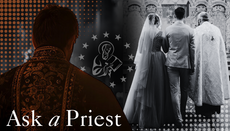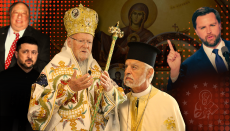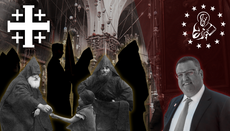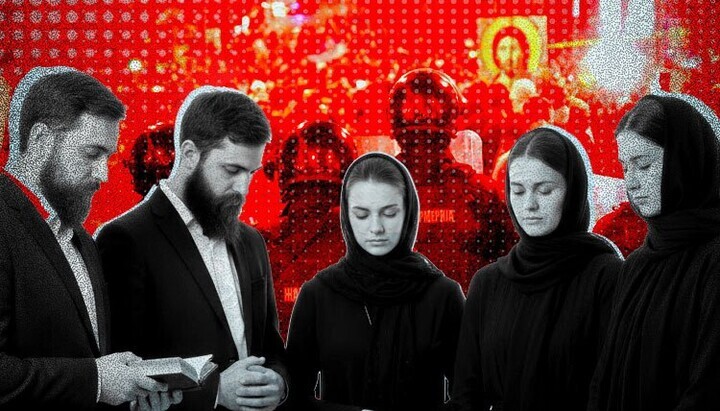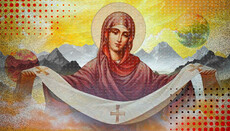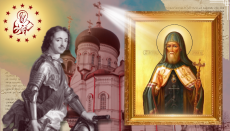“With God, All Things Are Possible”: The Monastery in Buchhagen on Orthodoxy in Germany and the World
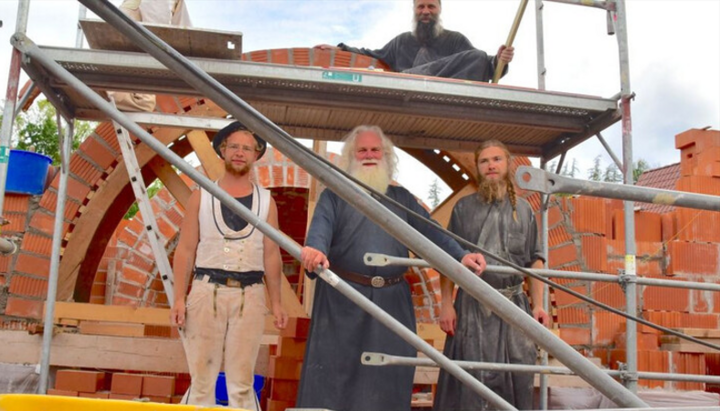
An interview by the UOJ of Germany with the monks of the Holy Trinity Orthodox Monastery in Buchhagen of the Bulgarian Orthodox Church, discussing the modern challenges facing Orthodox Christianity in Germany and around the world.
Originally published by Union Orthodoxer journalisten
In recent weeks, reports in the German media about threats against the Orthodox monastery in Buchhagen by radical groups have caused concern among many Orthodox Christians in Germany. Yet the monastery itself remains a place of silent prayer, not a political stage—a path to holiness rather than to worldly turmoil. Our editorial team reached out to Father Lazarus of the Orthodox Holy Trinity Monastery, not so much to focus on the scandal, but to talk about what truly matters to Orthodox Christians in Germany—what they should be hearing from the monks of this monastery.

What would you like to add about the recent reports of extremist threats against your monastery?
To us, all of that feels very distant. The whole political left-right divide is barely 180 years old—but Orthodoxy is 2,000 years old. We stand on an entirely different foundation: the Holy Tradition of the Orthodox Church, as I learned it on Mount Athos. We don’t ask anyone for their political views, and we exclude no one. Everyone who respects the peace and sanctity of this place is welcome, within our means. In fact, people from all backgrounds and nations come as pilgrims or visitors to our services. Despite the war, Russians and Ukrainians stand together before God and pray for peace.
It becomes a major problem when nationalism or any ideology turns into idolatry—which always happens when people don’t know the true faith and live far from God. But those who follow Christ in spirit and in truth will grow in love for God and for their neighbor, and they become immune to ideologies.
We are consecrated to God and live very withdrawn lives. Prayer, holy services, the building of the sanctuary, care for church chant, spiritual work, and pastoral care for visitors completely fill our days. This media campaign has built up a scarecrow that has nothing to do with the reality of the monastery.

We are now in the season of Great Lent. What should Orthodox Christians focus on during this time?
Great Lent is a time for gathering ourselves and deepening our spiritual life. It’s a gift, a chance to intensify the very things we are already called to do as Orthodox Christians: to avoid everything that separates us from God and practice more deeply all that draws us closer to Him.
1. Prayer—threefold in nature:
a) The prayer of the heart, which is focused entirely on Christ—like a sunflower always turning toward the sun. So we turn the eye of the soul toward Him and place ourselves in a receptive posture, to become one with Him. As He prayed in the High Priestly Prayer, that we may be one in Him as He is with the Father and the Spirit. This is the most intimate form of prayer.
b) The liturgical prayer of the Church. In the monastery, we celebrate Orthros, Vespers, Apodeipnon, and Divine Liturgy. The faithful who attend services on weekends delve into the divine mysteries, internalize the truths of the faith, and encounter the beauty of God and His revelations.
c) Intercessory prayer—for others and for ourselves. This is very personal. Everything is brought before God here. We also pray for blessing, healing, and divine help for all who are connected with us. Naturally, we also pray that God may turn what we’re currently facing into something good, and that even those who oppose us might come to the knowledge of truth.
2. Spiritual hygiene:
Remove from our lives all that is not of God, as far as we can. Bring into our lives what nourishes us spiritually and draws us closer to God. For example, fasting from the internet and media is important, because so much mental poison is spread there. What kind of music we listen to also matters. Disco, rock, and pop lower us, stir base instincts, and numb the soul—like drugs. They carry a lot of demonic energy. Those with a healthy spiritual sense will naturally recoil from it. Instead, one should listen to uplifting and spiritual music, especially sacred chants from the Church, but also works by Johann Sebastian Bach and the better classical composers.
Also: order and beauty. It's time for spring cleaning. Everything should be clean, tidy, and beautiful. Demons love filth and disorder. Cleanliness and harmony positively affect our whole being. Beauty is one of God's greatest "names," as St. Dionysius the Areopagite said. The Sunday of Orthodoxy celebrates the restoration of the original beauty of the image of God in man. This Orthodox ethos should extend into everyday life—fresh flowers on the table, a lit candle in the home icon corner, polished oil lamps, consistent household prayers, more frequent church attendance, living in love and peace with our neighbors. The Cappadocian Fathers also spoke of the divine beauty of God. Everything in the Church must be beautiful—including our homes, our souls, everything in and around us.
3. Inner freedom:
This can only be acquired through ascetical practice—training of the heart. This includes physical fasting and abstinence. These help us see to what extent we are free from bodily passions and compulsions. But we must not judge others. Fasting is not for exalting ourselves like the Pharisee. Instead, we are to recognize our own weaknesses and sins and seek God’s grace and strength to overcome them. This is also what the liturgical readings at the beginning of Lent call us to. More important—and often harder—than bodily fasting is "spiritual" fasting.

Your monastery in Germany belongs to the Bulgarian Orthodox Church, which recently elected a new Patriarch. What are your hopes and expectations for his leadership?
When a Patriarch dies, a new one must be elected within three months. Any metropolitan over 50 who has held their office for at least five years is eligible. The Holy Synod selects three candidates from among them. The electorate includes all bishops and metropolitans of the Bulgarian Church, the abbots/abbesses of major monasteries, five delegates per diocese (three priests and two laypeople), and representatives from theological schools—about 140 people in total. They meet in Sofia for the vote.
In our diocese, the synod was held in Berlin on June 2. Delegates included Fr. Zolo, Fr. Julian (Berlin), Fr. Nedjalko (Munich), Christo Berow (Berlin), and Martin Penev (Munich). Metropolitan Antoni of Western and Central Europe and Abbot Johannes of Buchhagen were ex officio electors.
We were especially pleased to see Metropolitan Daniel of Vidin among the eligible candidates. We had met him in 2007 as a monk working on a monastery roof with a hammer in hand—simple, hardworking, prayerful. A true fighter. A disciple of the late Metropolitan Nathanael of Nevrokop and fellow of Metropolitan Seraphim. He served in the U.S. and was recently bishop of Vidin. A man of Holy Tradition, unshaken by worldly power. He even recently spoke out for peace in Ukraine.
Eventually, he and Metropolitans Gabriel and Grigori became the final candidates. The election, held with transparency and under camera, was a deeply spiritual event. After two rounds, Daniel was elected.
His enthronement was in a packed cathedral despite the heat. When the choir missed its cue, the faithful clapped and cried, “Worthy, worthy, worthy!” The next morning, we attended his first Liturgy. Our Fr. Lazarus was asked to read the second set of intercessions—in German. Patriarch Daniel served with admirable calm and clarity, like an archangel. May God bless and preserve him.

Is your monastery considered unique? What makes it so?
Buchhagen is a traditional Orthodox monastery like others worldwide. With four monks and a novice, it’s really more of a large hermitage. But it’s unique in being a German Orthodox monastery in Germany.
When we were founding the monastery, Elder Joseph of Vatopedi (then still in Koutloumousiou) told us: “You must unite the Holy Tradition of Orthodoxy with the German spirit, language, and culture. There lies immense power: salvation for the German people and a gift for all of Orthodox Christianity.”
For 40 years, that’s how we’ve lived, prayed, and worked. A living German Orthodox tradition has quietly developed. In catechesis, we saw the need for clear German theological terminology. The West lost much of its theological clarity due to Latinization and heretical developments. We aim to express the insights of the holy fathers in German faithfully and clearly—avoiding foggy language.
This clarity also informs how we translate liturgical texts. The German praying today must grasp what the Greek Christian once felt when he heard the words of St. Basil or St. John Chrysostom. German is a rich but subtle language, so liturgical texts must be both clear and dignified.
This mission of inculturation also shapes our sacred space. The church we are building meets all liturgical requirements of Orthodox worship but consciously uses the architectural language of early German Christian buildings. There are parallels with Bulgarian, Georgian, and Russian styles, but also unique regional features. For instance, the separated crossing gives the church a distinct aesthetic and serves as a prototype for German Orthodox church architecture.


As ethnic German Orthodox monks, do you think Orthodoxy in Germany is still a "diaspora" religion?
Because Orthodoxy traditionally connects Church and national identity, it is still often seen in Germany as a "foreign religion"—like Islam. What is a strength in traditionally Orthodox countries—a fusion of culture and faith—can become a weakness in diaspora when trying to reach locals.
Many Germans are open to other nationalities and cultures—some even eager to swap their historically burdened identity for another. But this no longer applies to younger people. They’ve been swept into a pseudo-American, globalized identity and feel lost. They’re searching for something real—and Orthodoxy catches their attention. But if they sense it’s entangled with a foreign national identity, they hesitate. And if Orthodoxy goes globalist itself, it loses spiritual credibility.
That’s where Buchhagen comes in—a door-opener in both directions. Locals experience Orthodoxy in a way that feels native and natural—as if heaven opens. And immigrants see a vision for how their grandchildren and great-grandchildren can remain Orthodox in Germany. That’s why more and more young people are coming to our small, remote monastery.

Our platform has, for over ten years, not only reported on international ecclesiastical news but especially sought to convey the truth about the Ukrainian Orthodox Church (under Metropolitan Onuphry). Is this Church and its current difficult situation known here, and how is it perceived?
Globalist and anti-Christian forces have long sought to infiltrate, neutralize, and homogenize Orthodoxy in Eastern Europe. While they achieved considerable influence, they ultimately failed to fully succeed—because everywhere, there are faithful believers and hierarchs who resist the spirit of the age, who stand for truth and remain loyal to God.
Now, Orthodoxy is increasingly gaining ground in the West—though thirty years ago, Elder Theoklitos of Dionysiou (Mount Athos) once said to me: “In Western Europe, the Antichrist reigns—it is lost.” When I replied, “I cannot accept that my people are lost. God must intervene!” —he nodded and said: “In God, all things are possible—but it will be difficult.”
Now, thirty years later, we see signs of hope. In Munich, for example, 10% of the population is Orthodox. In every major German city, there are numerous Orthodox parishes—Russian, Romanian, Serbian, Georgian, Greek—steadily growing. And more and more Germans are turning to Orthodoxy.
Orthodoxy is, in truth, the only spiritual force that seriously opposes the rule of the Antichrist and truly unites us with God. For Satanists and antichristian powers, this is the ultimate catastrophe. That’s why they fight against Orthodoxy as a whole—and especially against those who cannot be corrupted—with an infernal, demonic energy. At the same time, they attack the cultures, languages, and traditions of the nations, because they seek a mass society that is easily manipulated, stripped of all traditional roots, where the individual is isolated and helpless.
The war in Ukraine—where thousands of Orthodox men perish daily on the physical battlefield—is one of the major battlegrounds of this spiritual war.
Years ago, around the time of the Council in Crete, and on the recommendation of our dear friend Metropolitan Gabriel of Lovech (Bulgaria), we visited Bishop Longin at the Monastery of Bănceni in Ukraine (Chernivtsi region). We were deeply impressed. With him, Abbot Sebastian, and others, there was an immediate and profound spiritual resonance—a true kinship that led to a deep friendship in Christ. Since then, we pray for one another as members of a spiritual brotherhood.
We also share such bonds with monasteries on Mount Athos, in Bulgaria, and Romania. In light of the current persecution of Christians in Ukraine, we are deeply concerned, and we pray fervently for the deliverance and preservation of our brothers and all faithful Orthodox Christians there.
Photo and video materials were taken from open sources, including those provided by the monks of the Orthodox Trinity Monastery of Buchhagen.
